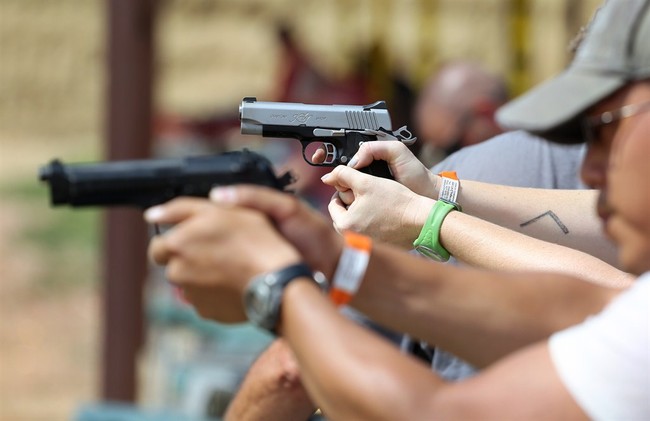Judges don’t have to be experts in a particular subject matter to rule on a case, but it’s certainly helpful to have a working knowledge about the issues that come before them. In some cases it can be hugely important. Ninth Circuit Judge Lawrence Van Dyke, for instance, absolutely schooled his colleagues in a blistering dissent to an opinion upholding California’s ban on “large capacity” magazines earlier this year, arguing that the majority lacked a “basic familiarity with firearms” that allowed them to rule the ban essentially has no impact on our ability to keep and bear arms for lawful purposes.
As the Los Angeles Times wrote about Van Dyke’s video dissent back in March:
He said he had “rendered inoperable” all the guns he was about to use in his demonstration. And he said he was making the video “not to supplement the factual record that we are using to decide this case” — something that would be squarely outside the scope of his authority as an appellate judge — but to provide a “rudimentary understanding” of why his colleagues in the court’s majority were wrong in their own analysis of the facts.
“I’m sure I could explain all of this in writing without being accused of improper fact-finding, but it’s obviously much more effective to simply show you,” VanDyke said.
He then handled several handguns, discussing their features — magazines, sights, grips, takedown levers, etc. — and explaining how to reassemble one in a way he said would make it “more dangerous” if “misused.”
The point, VanDyke said, was to “illustrate” his central argument in the underlying case: that, if the majority’s assessment of a large-capacity magazine being an accessory were legitimate, “the exact same argument would apply to essentially every part on this firearm, which would mean that essentially nothing on this firearm would be protected by the 2nd Amendment.”
Having a judge who’s knowledgable about how guns operate (and who owns one or more themselves) doesn’t guarantee that they’ll rule against a particular gun control law, but it certainly doesn’t hurt. So it’s exciting to see that Van Dyke might soon have a potential range buddy joining him on the Ninth Circuit in the near future.
President Trump’s nominee for the Ninth Circuit says he’s an IDPA member: https://www.judiciary.senate.gov/imo/media/doc/tung_sjq.pdf
— Firearms Policy Coalition (@gunpolicy) Jul 29, 2025
Eric Chunyee Tung is currently a partner at Jones Day, but previously clerked for Justices Antonin Scalia and Neil Gorsuch, which is another point in Tung’s favor. Belonging to the International Defensive Pistol Association, though, is a strong indication that he not only understands the technical aspects of firearms, but gets the importance of our right to keep and bear arms for self-defense.
This might come up during Tung’s confirmation hearings, as it did when Van Dyke was nominated to the Ninth Circuit. Van Dyke was asked about his membership in the NRA, and told then-Senator Dianne Feinstein that if he was confirmed he would resign as a member and pledged to “set aside any advocacy positions and policy views and faithfully apply the relevant precedent” in any cases he was involved in. Van Dyke was also quizzed about his membership in IDPA and whether that posed a conflict of interest, to which he replied:
I am currently a member of the International Defensive Pistol Association. I am no longer a member of the Western Nevada Pistol League. Unlike the NRA, neither of these organizations engages in political advocacy. Both exist to further the safe and legal enjoyment of recreational shooting sports. Membership in IDPA is required to participate in IDPA-sponsored sporting events, so I will likely continue my membership for that purpose.
I understand the concerns about judges belonging to political advocacy organizations. As much as I might like to have an NRA Life Member on the bench hearing 2A cases, I’d find it completely inappropriate if a chapter leader for Moms Demand Action was in a position to decide the constitutionality of a gun control law.
But as Van Dyke said when he was up for confirmation, the IDPA isn’t an advocacy organization. As the group lays out on its website:
IDPA is the use of practical equipment including full charge service ammunition to solve simulated real world self-defense scenarios using practical handguns and holsters that are suitable for self-defense use. The main goal is to test the skill and ability of an individual.
Now, one can assume that IDPA members believe strongly in the right of armed self-defense, but since the Supreme Court has held that is the core purpose of the Second Amendment I can’t imagine why that would be a disqualifying factor for a judicial nominee. Frankly, we need more judges who have a healthy respect for the right to keep and bear arms as well as a working knowledge about how firearms function.
Tung has an impressive legal background and seems eminently qualified to serve as a federal judge, but his involvement in the shooting sports is an added bonus… especially given the high volume of 2A cases that are underway in the Ninth Circuit’s jurisdiction. Here’s hoping Tung sails through the confirmation process and his able to bring his expertise and judicial philosophy to an appeals court that is currently dominated by judges who can never find fault with any gun control law that comes before them.
Editor’s Note: Radical leftist judges are doing everything they can to hamstring our Second Amendment rights.
Help us hold these judges accountable for their unconstitutional rulings. Join Bearing Arms VIP and use promo code FIGHT to get 60% off your membership.
Read the full article here





